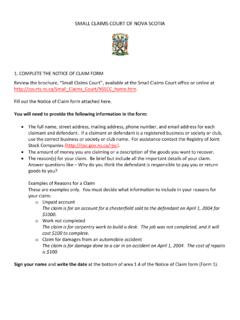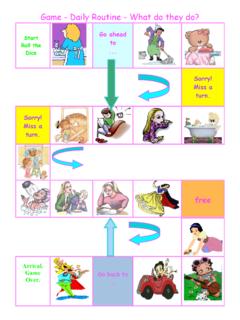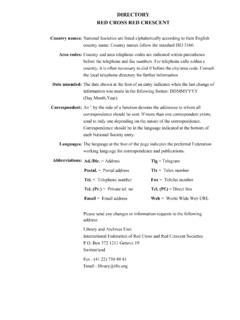Transcription of Registering & Recording Judgments What you Need to Know
1 Registering & Recording Judgments what you Need to The Registries of Deeds and Land Registration Offices are responsible for care and provision of access to timely and accurate land ownership and property records information to all those interested ( the general public, buyers, sellers, lawyers, title searchers). Individuals and institutions can record their financial interests in real property (land, houses, condominiums etc) in these registries. Judgments are one of the types of interests affecting real property that can be recorded there. The Personal Property Registry (PPR) is a centralized computer registry serving the entire province of Nova Scotia. The PPR allows both individuals and institutions to register their financial interest in personal property (cars, boats, appliances, bank accounts, etc.). Judgments can be registered in the PPR to attach to the Debtor's personal property. A Judgment Creditor is the person who has won a court case ( Small Claims Court or Supreme Court) and is owed money.
2 A Judgment Debtor is the person who lost the court case and owes money to the Judgment Creditor. Proclamation of the Land Registration Act (LRA) on March 24, 2003, will create significant changes to the Recording of Judgments against real property province-wide. The rules and procedures for the Registering of Judgments in the Personal Property Registry (PPR) are not changing, but they can be complex and confusing, particularly for non-regular users. The information below is provided to clarify both processes. 1. Where Should a Judgment be Recorded - At the Registry of Deeds/Land Registration Office, in the Personal Property Registry, or Both? You must register a Judgment in the Personal Property Registry (PPR) if you want to have the Sheriff execute on the judgment (garnish wages, seize bank accounts, sell land under execution). The Sheriff requires proof of registration in the PPR before enforcing any judgment. Proof of registration in the PPR is provided by giving the Sheriff a copy of the PPR Verification Statement (see below for more details).
3 You must register a judgment in the PPR if you want to establish the priority of your claim over other creditors. Registration in the PPR may also affect the debtor's credit rating. You must record a judgment at the Registry of Deeds or Land Registration Office (LRO) if you want to attach the judgment to real property owned by a judgment debtor (now or in the future). This registration will affect the judgment debtor's ability to buy, sell or re-mortgage land ( the debtor will be required to pay any outstanding Judgments from the proceeds, before their real property can be sold). You may record a judgment in the Registry of Deeds or LRO, even if the debtor does not presently own land, in anticipation that they might at some point in the future. You must have recorded the judgment in the Registry of Deeds or LRO at least one year before you ask the Sheriff to execute on the land if you want to have a Sheriff sell land owned by the Judgment Debtor to pay off the judgment, In addition, you must register the judgment in the PPR at any time prior to asking the Sheriff to execute.
4 2. Recording a Judgment at the Registry of Deeds or Land Registration Office Effective March 24, 2003, the current judgment provisions in the Registry Act will be replaced and a new Judgment Roll will be established in each of the 18 counties. A Judgment Roll is a computerized index of Judgments for a particular county, which can be searched by the name of the Judgment Debtor. Recording a judgment in the Judgment Roll for a particular county will affect the judgment debtor's ability to buy, sell or re-mortgage land in that county. A judgment recorded in a Judgment Roll is only effective in that county. In order to attach a judgment to land owned by the judgment debtor elsewhere in the province, the judgment must be recorded in other Registries of Deeds or LROs where land owned by the judgment debtor is situated. A judgment may be recorded in any of the 18 Judgment Rolls, even if the debtor does not presently own land, in case they might at some point in the future.
5 All Judgments presented for Recording at the Registry of Deeds or LRO on or after March 24, 2003, must contain: - the full name and address of the judgment creditor, - the full name and address of the judgment debtor, - information that tends to distinguish the judgment debtor from all other persons of the same or similar name (this may include date of birth), - the judgment amount ordered, - the names of the lawyers for both parties if applicable, and - seal and certificate of the court. Judgments recorded on or after March 24, 2003 are valid for five years from the date of Recording and may be renewed three times, each time for an additional five-year period. To renew a judgment recorded after March 24, 2003, the judgment creditor must prepare and record a Certificate of Judgment Renewal, before the judgment Recording expires. If a judgment is not renewed within the five year term, it cannot be renewed or re-recorded.
6 It is the responsibility of the Judgment Creditor to keep track of when the judgment's Recording will expire. No notification will be sent to the judgment creditor. A judgment recorded after March 24, 2003, will be deemed removed from the Judgment Roll when a Certificate of Satisfaction is recorded. When the new system is in place province-wide, satisfied Judgments and Judgments that have expired and not been renewed will be removed automatically. When a judgment is removed from the Judgment Roll, it is archived and is no longer viewable by the public. Judgments may be fully or partially released, in the same manner as today. There is a $ fee for Recording a judgment in a Judgment Roll. The cost of Recording a new Certificate of Judgm ent Renewal every five years is $ 3. Registering a Judgment in the Personal Property Registry A visit to the Registry of Deeds or Land Registration Office in your area is required to register a judgment in the Personal Property Registry.
7 This can be done in person, or you may hire a private searcher to register the judgment on your behalf. The searcher will charge an additional fee for this service. (See your local Registry of Deeds office for a list of local searchers.). To register the judgment in the PPR you must bring in the original Court Order or Certificate of Judgment and two pieces of ID (one of which must be a driver's license, passport, health card, or birth certificate). The Personal Property Registry System is computerized, and you must complete the registration yourself. If you are not comfortable using computers, you may wish to bring along a friend or relative to assist you. Staff are also available to guide you throughout the process. The Personal Property Security Act General Regulations give directions on how to use the PPR. system. The Regulations are available at the Registry of Deeds/LRO and on the Internet (see link below). It is recommended that you read the sections pertaining to registration before proceeding.
8 The most important sections are 20 and 21, which set out naming rules for personal property Judgments . If these rules are not followed, your registration may not be valid, and this may affect your ability to collect on the judgment. At the end of the registration process, the PPR system will generate a verification statement. Make sure you take this document with you, as you will need this to provide proof to the Sheriff that the judgment has been registered in the PPR. The fee for Registering a judgment in the Personal Property Registry is $ plus $ for each year registered. For example, a registration for one year is $ and a registration for two years is $ You may register a judgment in the PPR for as long as you wish, up to a maximum of 20 years. The judgment creditor is responsible for keeping track of when the judgment will expire. You have 30 days from the date of expiry to re-register and then renew the judgment at a cost of $ per year.
9 If the registration is not renewed within 30 days, and you wish to re-register the judgment, you must pay the initial registration fee again, plus the yearly fee to re-register. If the Sheriff has been asked to garnish the judgment debtor's wages, the registration must be kept current in the PPR ( if it takes 5 years to pay the outstanding debt by garnishing the debtor's wages, you must register the judgment in the PPR for a minimum of 5 years). For more information about enforcing Judgments and other court processes, please feel free to contact the closest Court Administration Office, or local Registry of Deeds or Land Registration Office. For a listing of locations and phone numbers, visit our web site: Land Registration Act - Judgment Requirements Table INFORMATION IN RELATION TO THE DEBTOR. Required Information Helpful Hints 1 Name of Debtor If Debtor is an individual, the name must include first and last name(s) and should include, but does not require, a middle name(s).
10 2 Additional Information for the Debtor (to distinguish from those with similar names). Must include at least one of the following for the Debtor (please note a middle name is not considered additional information): Civic Address 12 Main Street, Halifax, NS. Date of Birth May 12, 1972. Occupation and Employer Salesperson, Sears Inc. Designations Dr., Rev., Hon. Spouse's / Parents' / Children's Name Spouse of Marie Rodgers AKA or Alias (Nickname or significantly different given name, not a short form or different spelling). Phillip Skipper Smith NOT Steven aka Stephen Limited (Ltd.) or Incorporated (Inc.) Bob's Auto Ltd. GES Consulting Inc. RJS Business Number 123456789. NOTE: Social Insurance Numbers may not be used. Name of Bank and location would be acceptable. 3 Address for the Debtor Mailing address (postal code) is not required for debtor, just an address. The address should be a civic address if known (LR Admin Regs 2(2)(b)).






